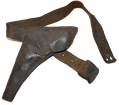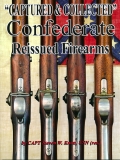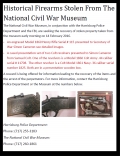site search
online catalog
Firearms
Showing 261 to 280 out of 285
SCARCE NEW MODEL 1865 SHARPS STILL IN PERCUSSION NEAR FACTORY NEW
There are no appreciable differences between the NM1863 and NM1865 Sharps other than the stamped model designation by the company, and its occasional absence, which some have speculated was due to… (490-2531). Learn More »
.45 CALIBER IRON PISTOL BALL MOLD & BARREL TOOL
Iron scissor-type mold to cast a lead round ball for revolvers. Measures approximately 3.5” long overall. Single cavity mold with spout. Sprue cutter is formed between the two handles. Cavity… (1164-46). Learn More »
VERY FINE ORIGINAL, FIRST TYPE, TWO-TRIGGER FRANK WESSON RIFLE
Here is an original, seldom-seen Frank Wesson single-shot breechloader in excellent condition, one of the best that we have handled. This 1st Type, twin-trigger, .44 caliber rimfire, Wesson rifle made… (779-09). Learn More »
VERY LARGE POWDER FLASK BY J. DIXON & SONS, SHEFFIELD
This very large flask has to have been for shotguns. Constructed with a copper body, with brass top and spout. Measures approximately 11” tall x 5” at widest point. Unadorned body. Thumb tab and… (172-5639). Learn More »
POWDER FLASK FOR REVOLVERS
This flask is for early pocket model revolvers. Constructed with a copper body, with brass top and spout. Measures approximately 6” tall x 2.75” at widest point. Both sides are plain. Thumb tab… (172-5638). Learn More »
CIVIL WAR FLAP HOLSTER FOR M1849 POCKET MODEL REVOLVER
This is a black leather holster made for revolvers. The leather still shows the “profile” of a revolver cylinder and barrel. A .31 caliber “pocket” model with long barrel fits into this… (172-5636). Learn More »
BLUED SMITH & WESSON NO. 2 ARMY REVOLVER
This is a Smith & Wesson, No. 2, Old Model Army Revolver. It is a .32 caliber, six-shot revolver with a 5” barrel, rosewood handles. Post-Civil War serial number 60737. Production began in 1861,… (1000-452). Learn More »
.577 CALIBER ENGLISH ENFIELD PATTERN CARTRIDGE
Fabricated by Ludlow Brothers of Birmingham, England. Nice display in a 8.25” x 12.25” Riker case. Photocopy of an original wrapper at top with info sheet below, and then the cartridge at the… (M24055). Learn More »
RELIC M1873 MAYNARD BULLET MOLD
Iron bullet mold measures approximately 7 ½” long. Two halves pinned with rivet and has floating sprue cutter. Iron is pitted but not badly; could be “dug” or out of a barn. Still opens and… (1117-238). Learn More »
CIVIL WAR KERR REVOLVER HOLSTER ON BELT
This is a black leather holster made to accommodate the Kerr revolver. The leather still shows the “profile” of a revolver cylinder. The holster “pocket” measures approximately 9 ¼” along… (1117-97). Learn More »
BRASS BULLET MOLD FOR “PICKET” TYPE BULLET
Scissor-type mold made of brass. Casts a .44 caliber “picket” or “sugarloaf” style of bullet with rounded base. Measures 6 ½” overall. Brass has a blotchy, dark patina. … (1117-234). Learn More »
ENGLISH PERCUSSION CAP PACK
This is a “pulp bag” of percussion caps as manufactured at the Royal Laboratory at Woolwich, England. Each pack was to contain 15 copper percussion caps. Packages are full of caps and twisted… (M25673). Learn More »
CONFEDERATE CAPTURED US CONTRACT MODEL 1861 MUSKET BY NORWICH
This contract Model 1861 by the Norwich Arms Company is in good condition with a very clear and unmistakable “Q” stamped just forward of the trigger guard showing that it was captured, cleaned and… (362-866). Learn More »
“CAPTURED & COLLECTED” – CONFEDERATE REISSUED FIREARMS
Knott, USN (ret.), Capt. Steven W. Published by The Horse Soldier, 2019. Softcover, 80 pp., heavily illustrated with color photographs. This monograph examines the Confederate system used to recover,… (ST501179). Learn More »
THE CONFEDERATE ENFIELD - NEW REVISED EDITION
***NEWLY REVISED EDITION, JUST ARRIVED FROM THE PRINTER!*** Written by Capt. Steven W. Knott, USN (Ret). Softcover, 54 pages. Contains minor corrections from the first edition, as well as a new… (ST501177). Learn More »
.54 CALIBER CARTRIDGE FOR FAYETTEVILLE RIFLE
Dark worn paper cartridge with conical bullet in nose. The body of the cartridge is complete but the paper looks weary. The tail has separated from the cartridge due to age and weakness of the… (169-280). Learn More »
$200.00
Originally $250.00
.577 CALIBER ENGLISH ENFIELD PATTERN CARTRIDGE
Fabricated by Ludlow Brothers of Birmingham, England. Nice display in a 8.25” x 12.25” Riker case. Photocopy of an original wrapper at top with info sheet below, and then the cartridge at the… (M24051). Learn More »
PACKAGE OF 4MM FLOBERT PRIMED CASES
Here is a round pasteboard box of primed cases for a 4mm Flobert pistol. Printed label on lid, printed red “tape” around side. Empty cases have “KC” headstamp. Good condition, but unknown… (172-4106). Learn More »
HISTORICAL FIREARMS STOLEN FROM THE NATIONAL CIVIL WAR MUSEUM IN HARRISBURG, PA
Please click on the photograph above to view a flyer containing information regarding a Model 1860 Henry Rifle and pair of cased presentation Colt Revolvers identified to Secretary of War Simon…. Learn More »
OPENED FULL PACK OF 1870 SPENCER CARBINE BLANKS
Pack has the original brown wrapper and label but string is replacement. Top is cut and held in place by string. Lid can be lifted to view cartridges. Light blue label with black printing reads “10… (172-3989). Learn More »
Showing 261 to 280 out of 285
Most Popular
Historical Firearms Stolen From The National Civil War Museum In Harrisburg, Pa »
Theft From Gravesite Of Gen. John Reynolds »
Selection Of Unframed Prints By Don Troiani »
Fine Condition Brass Infantry Bugle Insignia »
British Imported, Confederate Used Bayonet »
Scarce New Model 1865 Sharps Still In Percussion Near Factory New »
featured item
TWO PEN AND INK DRAWINGS BY ALFRED WAUD / HORATIO WAIT OF BLOCKADING SCENES OFF MOBILE 1863
Working as a special artist for Harpers Weekly from late 1861 through 1865, Alfred R. Waud (1828-1891) is one of the best-known Civil War artists. In postwar years he was connected with Century Magazine, which published numerous accounts of the Civil… (557-12). Learn More »
site search
Upcoming Events
APRIL 12-13: SPRING GETTYSBURG MILITARY ANTIQUES SHOW; All Star Events Complex Learn More »






















